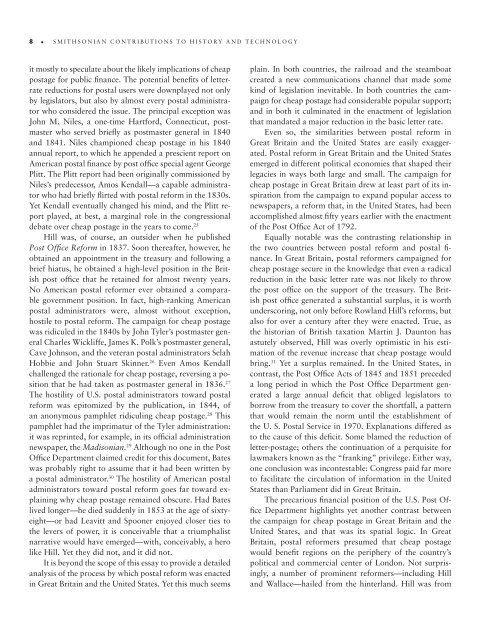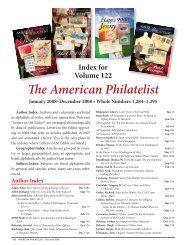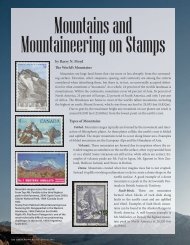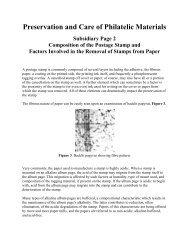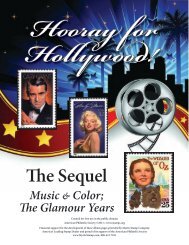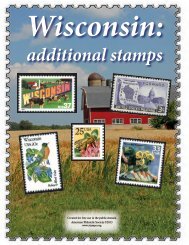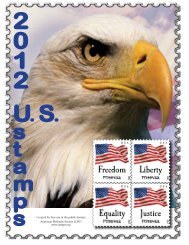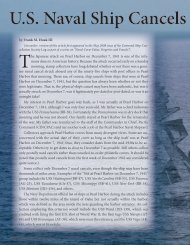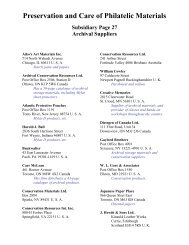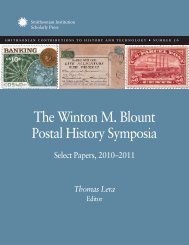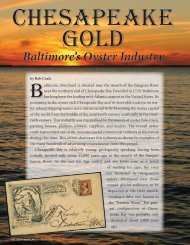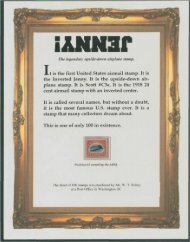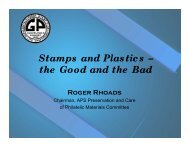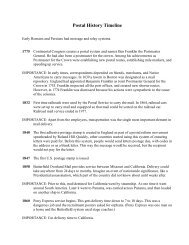The Winton M. Blount Postal History Symposia - Smithsonian ...
The Winton M. Blount Postal History Symposia - Smithsonian ...
The Winton M. Blount Postal History Symposia - Smithsonian ...
- No tags were found...
You also want an ePaper? Increase the reach of your titles
YUMPU automatically turns print PDFs into web optimized ePapers that Google loves.
8 • s m i t h s o n i a n c o n t r i b u t i o n s t o h i s t o ry a n d t e c h n o l o g yit mostly to speculate about the likely implications of cheappostage for public finance. <strong>The</strong> potential benefits of letterratereductions for postal users were downplayed not onlyby legislators, but also by almost every postal administratorwho considered the issue. <strong>The</strong> principal exception wasJohn M. Niles, a one- time Hartford, Connecticut, postmasterwho served briefly as postmaster general in 1840and 1841. Niles championed cheap postage in his 1840annual report, to which he appended a prescient report onAmerican postal finance by post office special agent GeorgePlitt. <strong>The</strong> Plitt report had been originally commissioned byNiles’s predecessor, Amos Kendall—a capable administratorwho had briefly flirted with postal reform in the 1830s.Yet Kendall eventually changed his mind, and the Plitt reportplayed, at best, a marginal role in the congressionaldebate over cheap postage in the years to come. 25Hill was, of course, an outsider when he publishedPost Office Reform in 1837. Soon thereafter, however, heobtained an appointment in the treasury and following abrief hiatus, he obtained a high- level position in the Britishpost office that he retained for almost twenty years.No American postal reformer ever obtained a comparablegovernment position. In fact, high- ranking Americanpostal administrators were, almost without exception,hostile to postal reform. <strong>The</strong> campaign for cheap postagewas ridiculed in the 1840s by John Tyler’s postmaster generalCharles Wickliffe, James K. Polk’s postmaster general,Cave Johnson, and the veteran postal administrators SelahHobbie and John Stuart Skinner. 26 Even Amos Kendallchallenged the rationale for cheap postage, reversing a positionthat he had taken as postmaster general in 1836. 27<strong>The</strong> hostility of U.S. postal administrators toward postalreform was epitomized by the publication, in 1844, ofan anonymous pamphlet ridiculing cheap postage. 28 Thispamphlet had the imprimatur of the Tyler administration:it was reprinted, for example, in its official administrationnewspaper, the Madisonian. 29 Although no one in the PostOffice Department claimed credit for this document, Bateswas probably right to assume that it had been written bya postal administrator. 30 <strong>The</strong> hostility of American postaladministrators toward postal reform goes far toward explainingwhy cheap postage remained obscure. Had Bateslived longer—he died suddenly in 1853 at the age of sixtyeight—orhad Leavitt and Spooner enjoyed closer ties tothe levers of power, it is conceivable that a triumphalistnarrative would have emerged—with, conceivably, a herolike Hill. Yet they did not, and it did not.It is beyond the scope of this essay to provide a detailedanalysis of the process by which postal reform was enactedin Great Britain and the United States. Yet this much seemsplain. In both countries, the railroad and the steamboatcreated a new communications channel that made somekind of legislation inevitable. In both countries the campaignfor cheap postage had considerable popular support;and in both it culminated in the enactment of legislationthat mandated a major reduction in the basic letter rate.Even so, the similarities between postal reform inGreat Britain and the United States are easily exaggerated.<strong>Postal</strong> reform in Great Britain and the United Statesemerged in different political economies that shaped theirlegacies in ways both large and small. <strong>The</strong> campaign forcheap postage in Great Britain drew at least part of its inspirationfrom the campaign to expand popular access tonewspapers, a reform that, in the United States, had beenaccomplished almost fifty years earlier with the enactmentof the Post Office Act of 1792.Equally notable was the contrasting relationship inthe two countries between postal reform and postal finance.In Great Britain, postal reformers campaigned forcheap postage secure in the knowledge that even a radicalreduction in the basic letter rate was not likely to throwthe post office on the support of the treasury. <strong>The</strong> Britishpost office generated a substantial surplus, it is worthunderscoring, not only before Rowland Hill’s reforms, butalso for over a century after they were enacted. True, asthe historian of British taxation Martin J. Daunton hasastutely observed, Hill was overly optimistic in his estimationof the revenue increase that cheap postage wouldbring. 31 Yet a surplus remained. In the United States, incontrast, the Post Office Acts of 1845 and 1851 precededa long period in which the Post Office Department generateda large annual deficit that obliged legislators toborrow from the treasury to cover the shortfall, a patternthat would remain the norm until the establishment ofthe U. S. <strong>Postal</strong> Service in 1970. Explanations differed asto the cause of this deficit. Some blamed the reduction ofletter- postage; others the continuation of a perquisite forlawmakers known as the “franking” privilege. Either way,one conclusion was incontestable: Congress paid far moreto facilitate the circulation of information in the UnitedStates than Parliament did in Great Britain.<strong>The</strong> precarious financial position of the U.S. Post OfficeDepartment highlights yet another contrast betweenthe campaign for cheap postage in Great Britain and theUnited States, and that was its spatial logic. In GreatBritain, postal reformers presumed that cheap postagewould benefit regions on the periphery of the country’spolitical and commercial center of London. Not surprisingly,a number of prominent reformers—including Hilland Wallace—hailed from the hinterland. Hill was from


